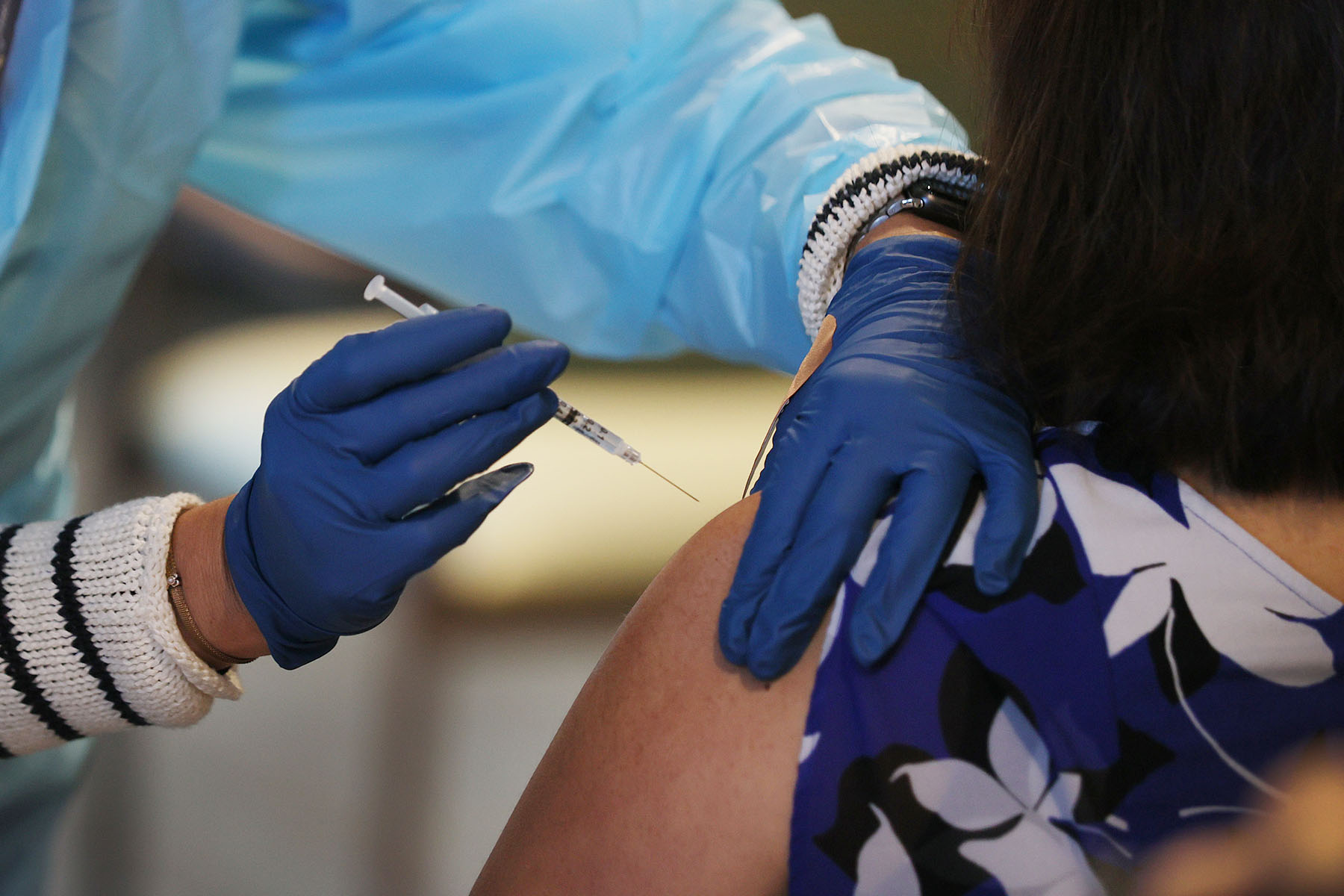Heading into respiratory illness season, states and clinicians are working to encourage pregnant patients to get COVID-19 vaccinations, even though the U.S. Department of Health and Human Services no longer recommends that they should.
Along with being older and having an underlying health condition, pregnancy itself is a risk factor. Pregnant women are more vulnerable to developing severe illness from COVID-19. They’re also at high risk for complications, including preterm labor and stillbirth. The vast majority of medical experts say getting the shot is safe and effective — much safer than having the illness.
But HHS Secretary Robert F. Kennedy Jr. announced in May that the agency would no longer recommend that pregnant women get the vaccine. Before testifying before Congress in June, Kennedy circulated a document on Capitol Hill claiming higher rates of fetal loss after vaccination. But the authors of those studies told Politico that their work had been misinterpreted.
Experts say the federal shift puts the onus on state health agencies to ramp up vaccine guidance and outreach. Clinicians and public health organizations are trying to dispel misinformation and make sure information reaches low-income people and people of color, who had higher maternal death rates during the pandemic. During the first two years of the pandemic, the virus contributed to a quarter of maternal deaths, according to federal data.
“We are severely disappointed,” said Dr. Neil Silverman, a professor of clinical obstetrics and gynecology at the University of California, Los Angeles David Geffen School of Medicine. He has studied vaccines and pregnancy for the past 15 years and specializes in high-risk pregnancies.
Silverman called the federal shift a “public health tragedy on a grand scale.”
Vaccinations against COVID-19 help prevent severe illness in pregnant people as well as their newborns, who are too young to get vaccinated, Silverman said. In what’s called passive immunity, vaccinated mothers pass on antibodies to their babies through the placenta and through breast milk.
“State public health agencies are probably going to have to implement vaccine guidance that differs from the federal recommendations. And that’s going to be an interesting can of worms,” said OB-GYN Dr. Mark Turrentine, a professor of obstetrics and gynecology at the Baylor College of Medicine in Texas.
Turrentine serves on a board of the American College of Obstetricians and Gynecologists that focuses on immunization and infectious diseases. He said his recent pregnant patients who had COVID-19 hadn’t gotten the vaccine.
“The change in guidance on the federal level just really makes a lot of confusion, and it makes it very challenging to try to explain to individuals why all of a sudden the difference,” Turrentine said.
A slew of public health organizations have been making a concerted effort to dispel vaccine myths. They include the Society for Maternal-Fetal Medicine, a Washington, D.C.-based nonprofit organization of maternal-fetal experts. At a news briefing the society held this month, clinicians stressed the safety and long-standing science behind COVID-19 vaccines, as well as the shots for RSV and the flu. Cases of RSV and the flu tend to peak in the winter months, while in recent years COVID-19 cases have spiked in the summer and the winter.
Dr. Brenna Hughes, an OB-GYN who chairs the organization’s infectious diseases and emerging threats committee, pointed to survey data from the federal Centers for Disease Control and Prevention showing that less than a third of eligible pregnant patients received COVID-19 shots, and only 38% received RSV shots for the 2023 to 2024 season. Less than half — 47% — received flu shots, and 59% received TDAP (whooping cough) vaccines.
CDC data shows that for last year’s and this year’s season, only between 12% and 14% of pregnant patients got the COVID-19 vaccine.
“The complications from the infection are so much greater than the complications and the very few and typically minor adverse events that might occur from the vaccine,” said microbiologist Sabra Klein, a professor of molecular microbiology and immunology at the Johns Hopkins Bloomberg School of Public Health.
In June, the American College of Obstetricians and Gynecologists and 30 other professional health organizations signed a letter urging insurers to continue covering the COVID-19 shot for pregnant women, and have continued to urge coverage since then.
CVS Caremark, one of the nation’s three major pharmacy benefit managers, told Stateline it will continue covering the vaccine for pregnant women. The Arizona, California and North Carolina state Medicaid agencies also told Stateline they are still currently covering COVID-19 vaccines for pregnant women.
Dr. Kimberly Fortner, president-elect of the Infectious Diseases Society for Obstetrics and Gynecology, said during the maternal-fetal medicine briefing that she hopes medical groups’ joint messaging will bolster insurers.
“Hopefully by us linking arms, that can then help develop consistency so that insurers will continue to pay for the vaccine,” she said.
Exacerbating disparities
Dr. Ayanna Bennett, director of the District of Columbia Department of Health, said the federal government’s new stance has upended “a system that’s been stable for a very long time.”
Bennett said her agency used federal pandemic aid to shore up vaccine outreach efforts to communities of color. Now that flow of money is ending.
The changes in federal guidance and funding will “almost certainly exacerbate” maternal health disparities, said Marie Thoma, a perinatal epidemiologist and an associate professor in the University of Maryland Department of Family Science who researches pregnancy and COVID-19.
Black and Indigenous women died at higher rates. The virus exacerbated existing racial disparities in maternal health — and created new ones: Latina mothers, who generally see low rates of maternal mortality, saw deaths surge to 28 per 100,000 in 2021. Their rate was about 12 per 100,000 in 2018, according to federal data.
“We are going in with some exposure already that we didn’t have during the start of the pandemic. So, there will be some protection, but now that will erode,” said Thoma. “If we’re not getting vaccines, or if people are hesitant to take them, we could see some increase.”
Silverman said the administration’s efforts to strip mentions of race from government policies makes it difficult for institutions to reach populations at greatest risk. He called the dismissal of decades of data “saddening and infuriating.”
“The politicization of the vaccine process, or access to it, is what concerns me the most,” said Dr. Yvette Martas, a Connecticut OB-GYN who chairs the board of directors of the Hispanic Health Council.
Many women “are trying to navigate an economic system that’s not always in their favor in terms of also providing access to the kind of educational material that they need,” she said.
Not just COVID-19
In June, Kennedy ousted all 17 members of the CDC’s vaccine advisory committee, replacing them with some members who are vaccine skeptics.
The change is creating chaos. Some states have vaccine laws, such as mandates for kids and coverage statutes, that are specifically tied to the committee’s decisions.
The Vaccine Integrity Project at the University of Minnesota called on frontline health workers, health officials and professional societies to “counter the spread of inaccurate and confusing vaccine information.”
At a news briefing this month held by the Association of State and Territorial Health Officials, representatives from Alabama, Connecticut and Washington, D.C., said they will continue to recommend vaccines.
Alabama’s state health officer, Dr. Scott Harris, said clinicians will be instrumental in getting correct vaccination information to patients.
“We don’t think that we necessarily have the same authoritative voice that we might have had a decade ago in trying to guide people in what to do, but we do believe that people trust their health care providers in most cases and are certainly willing to listen to them,” he said at the briefing.
Bennett said she is hopeful that strong, consistent messaging from respected medical organizations will help combat confusion.
“Having established groups like the American Academy of Pediatrics or the American College of Obstetrics and Gynecology make very firm recommendations that keep us essentially not changed from where we have been, I think, should reassure families,” she said.
Stateline reporter Nada Hassanein can be reached at [email protected].
Stateline is part of States Newsroom, a nonprofit news network supported by grants and a coalition of donors as a 501c(3) public charity. Stateline maintains editorial independence. Contact Editor Scott S. Greenberger for questions: [email protected].





